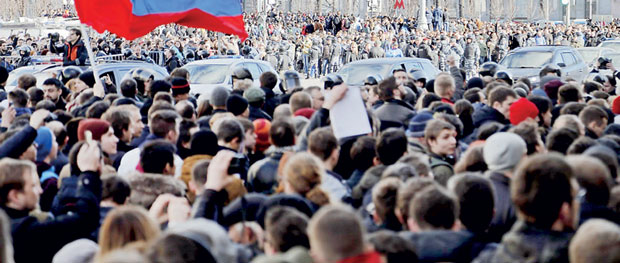29 Mar 2017 - {{hitsCtrl.values.hits}}

(c) 2017, The Washington Post ·
On Monday, March 20, Denis Voronenkov met a Post journalist in the lobby bar of Kiev’s five-star Premier Palace Hotel, along with his wife, seeming to feel he was in danger. “For our personal safety, we can’t let them know where we are,” he said. Both Voronenkov and his wife were former members of Russia’s lower house of parliament, the State Duma, but defected to Ukraine, wherehe became an outspoken critic of Russian President Vladimir Putin and his cronies.
“It’s a totally amoral system, and in its anger it may go to extreme measures,” he said to the journalist. “There’s been a demonization of us. It’s hard to say what will happen. The system has lost its mind. They say we are traitors in Russia.” Less than 72 hours later, Voronenkov was shot twice in the head in broad daylight outside the same lobby bar. Ukraine’s president, Petro Poroshenko,called it “an act of state terrorism by Russia,” which Putin’s spokesman called “absurd.”
The same week, on March 21, Nikolai Gorokhov, a lawyer for the family of whistleblower Sergei Magnitsky, fell from the fourth floor of his apartment building, suffering serious injuries. Gorokhov was scheduled to appear in court the next day on a matter relating to Magnitsky, who died in prison from maltreatment in November 2009 after revealing a massive financial fraud by Russian officials.
These are only the latest in the string of violence and death that has trailed those who criticize Putin and his regime. Boris Nemtsov, the opposition leader and one-time deputy prime minister, was assassinated while walking home across a bridge within sight of the Kremlin walls. Alexander Litvinenko, a former KGB officer who had become a fierce critic of Putin, was killed in London with radioactive polonium placed in his tea. The killers - and those who gave them orders - have not been brought to justice. These are the marks of a regime that practices the most brutal retribution and coercion against its critics.
Contrast this with the courage of Alexei Navalny, an anti-corruption campaigner and potential challenger to Putin, who has persisted in questioning the honesty of Russia’s leaders despite repeated, crude attempts to silence him with trumped-up prosecutions. Recently, he published a report showing that Prime Minister Dmitry Medvedev has accumulated more than $1 billion worth of property. On Sunday, tens of thousands of people in more than 80 Russian cities heeded Navalny’s call for unsanctioned, peaceful protests against corruption. The authorities censored the protests on state- controlled news media and arrested hundreds for the crime of participating in an unapproved rally, including Navalny.
What the tableau showed most clearly is that, once again, Russian state and society have cleaved. The state is in the hands of Putin and his cronies, who enrich themselves in power, neutralize their foes and summon the riot police to squelch dissent. Russian society - at least some of it - sees the Putin regime for what it is. On the streets Sunday, their understanding could not be denied and their discontent could not be killed.
17 Nov 2024 1 hours ago
17 Nov 2024 1 hours ago
17 Nov 2024 4 hours ago
17 Nov 2024 5 hours ago
17 Nov 2024 5 hours ago